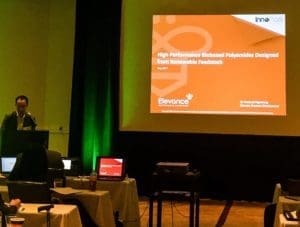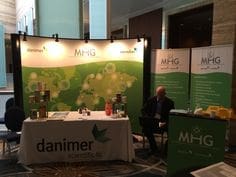 We got a chance to connect with UrthPact’s own VP of Technology, Derek Helmer, and VP of Operations, Mike Pousland, about their recent trip to Newark, NJ for the InnoPlast Solutions Conference, May 23-25th. The InnoPlast Solutions goal is to adopt a mission related to plastics, innovation, and business growth and select a team of technical and business savvy experts to educate participants. The conference offers solid networking opportunities as well for the plastic and bioplastic industry. The focus and theme of this year’s conference, BioBased Re-Revolution of Plastics, was to highlight the utilization of non-fossil raw materials that leads to preservation of petroleum resources and reduction of air/ land/ water pollution.
We got a chance to connect with UrthPact’s own VP of Technology, Derek Helmer, and VP of Operations, Mike Pousland, about their recent trip to Newark, NJ for the InnoPlast Solutions Conference, May 23-25th. The InnoPlast Solutions goal is to adopt a mission related to plastics, innovation, and business growth and select a team of technical and business savvy experts to educate participants. The conference offers solid networking opportunities as well for the plastic and bioplastic industry. The focus and theme of this year’s conference, BioBased Re-Revolution of Plastics, was to highlight the utilization of non-fossil raw materials that leads to preservation of petroleum resources and reduction of air/ land/ water pollution.
As far as the UrthPact team is concerned, this conference delivered a great value as it was full of participant engagement and packed full of information rich presentations showcasing topics related to the bio-industry.
Without a doubt, the biggest take-away was the strong drive on the part of attendees and presenters to replace petroleum as a feedstock for polymers before the Earth runs out of oil or oil prices become too high. Research has shown that solutions to this pressing problem will be found in developing bio-based replacements for existing polymers such as BioPE, BioPET, PEF, and PTF or finding new polymers that can replace existing materials such as PHA that do not source from oil.
There seems to be a lot of interest in biodegradable and compostable materials which is exciting because they target a solution that could reduce waste being generated in the developing world, where waste management is the poorest. Unfortunately, though, we are discovering that major brand owners have a low interest in compostable materials due to cost, density, and low municipal end-of-life solutions. This is something that will need to be worked on with renewed effort.
The conference featured a number of impressive speakers and presentations that provided key insights into industry innovation and provided informed glimpses of what the future might bring for bioplastics. For example, Mango Materials is making inroads into producing PHA from waste water plant methane. While the technology looks highly promising, it is still years and millions of dollars from scaling to production.
 Synvia and DuPont/ADM both offered presentations showing the possibility of PTF and PEF as credible bio-based, recyclable replacements for PET. Danimer Scientific unveiled a PHA product that is perhaps closest to market but currently lacks a specific application that can help get the blend and performance characteristics focused.
Synvia and DuPont/ADM both offered presentations showing the possibility of PTF and PEF as credible bio-based, recyclable replacements for PET. Danimer Scientific unveiled a PHA product that is perhaps closest to market but currently lacks a specific application that can help get the blend and performance characteristics focused.
As a result of these and other presentations and demonstrations, the UrthPact team came away inspired to continue and expand our own efforts into creating the world’s best bioplastics. By replacing petroleum-based plastics with plant-based ones, we’re able to partner with forward-thinking manufacturers to bring attractive, eco-friendly products to market that will enhance consumers’ daily lives while helping protect and sustain our fragile environment.



